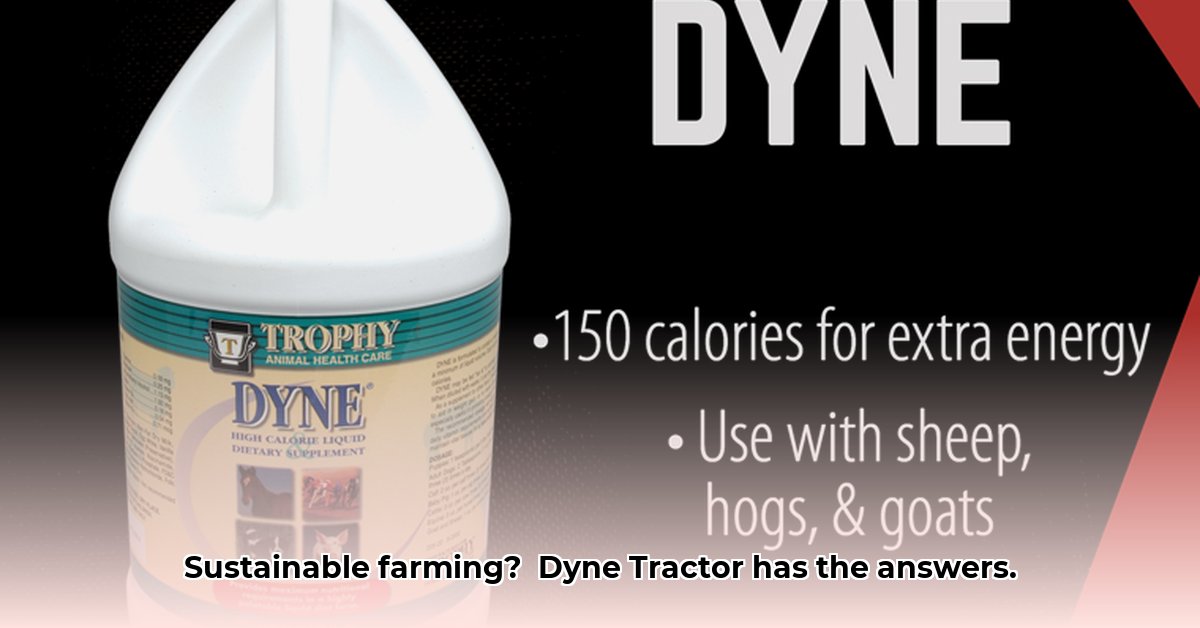
The Promise and Perils of High-Calorie Livestock Supplements in Sustainable Agriculture
Feeding livestock sustainably presents a significant challenge to modern agriculture. The quest for efficient and environmentally responsible practices has led to exploration of high-calorie supplements, such as those offered by Dyne Tractor Supply. These supplements promise increased animal productivity and potentially reduced environmental impact, but a nuanced perspective is crucial before widespread adoption. This article examines the benefits, drawbacks, and future directions of using such supplements within the framework of sustainable farming, offering actionable insights for various stakeholders. For more information on sustainable agricultural practices, check out this helpful resource.
Reducing Methane Emissions: A Key Benefit
One significant advantage of high-calorie supplements like those from Dyne is their potential to mitigate methane emissions from livestock. Methane, a potent greenhouse gas, is a substantial byproduct of animal agriculture. Research suggests that certain feed additives may decrease methane output by up to 15 percent. This reduction represents a considerable step towards lessening the environmental footprint of livestock farming. However, this potential benefit needs to be considered within a broader context.
Economic Considerations and the Total Environmental Impact
While reduced methane emissions are environmentally beneficial, the economic viability of using high-calorie supplements must be carefully analyzed. These supplements typically carry a higher price tag compared to traditional feeds. Consequently, farmers must evaluate if the increased productivity and potential premium for sustainably produced goods offset the increased input costs. Moreover, a comprehensive life-cycle assessment (LCA) is essential to fully grasp the environmental impact, accounting for the energy expended in supplement production, packaging, and transportation. Further research is urgently needed to provide data-driven conclusions about this process. Is the improved efficiency of agricultural production truly offset by its environmental effects? Detailed Life Cycle Assessments (LCAs) are critical for understanding the full effect.
Consumer Demand and Transparency: A Crucial Factor
Consumer preferences are increasingly driving the demand for sustainably produced food. Consumers are willing to pay a premium for products from farms emphasizing environmentally conscious practices and animal welfare. This presents an opportunity for farmers using high-calorie supplements, but it necessitates transparency. Farmers using these supplements need to clearly communicate their methods to build consumer trust and justify the potentially higher price points. What strategies can farmers implement to increase transparency and build consumer trust? Open labeling and direct engagement with consumers are key.
Actionable Strategies for Sustainable Farming
The path towards sustainable livestock farming necessitates a concerted effort from various stakeholders. Effective implementation requires collaboration and strategically planned actions.
Short-Term and Long-Term Goals for Key Stakeholders
The following table outlines actionable short-term (0-1 year) and long-term (3-5 years) goals for key players involved in implementing these solutions:
| Stakeholder Group | Short-Term Actions (0-1 Year) | Long-Term Actions (3-5 Years) |
|---|---|---|
| Dyne Tractor Supply & Producers | Conduct comparative cost-benefit analyses for various animal types. Conduct pilot studies to validate efficacy in various contexts. | Invest in research to understand complete environmental impact; explore eco-friendly production and packaging; develop refined dosage recommendations based on ongoing research results. |
| Farmers | Implement small-scale trials to assess on-farm effectiveness. | Adopt farming methods based on gathered data; participate in carbon offset programs; explore premium market opportunities. |
| Consumers | Inquire about feed sources and environmental impact; support sustainable farming initiatives. | Advocate for policies supporting sustainable agriculture; actively choose sustainably-produced products. |
| Governments | Fund research into improved sustainable feeds; develop clear guidelines and regulations. | Create and enforce regulations promoting sustainable practices; incentivize adoption through subsidies; integrate sustainability goals into national agricultural strategies. |
Harnessing the Potential of High-Calorie Supplements
The utilization of high-calorie supplements like those from Dyne Tractor Supply presents both opportunities and challenges for sustainable agriculture. A careful balancing act is required to maximize the economic benefits while minimizing environmental impact. Through collaborative research, open communication, and data-driven decision-making, the potential of these supplements can be harnessed while mitigating their drawbacks. The journey towards sustainable animal agriculture relies on continuous adaptation, innovation, and collective action. How can we collaboratively optimize the environmental and economic benefits of high-calorie livestock supplements? Open dialogue and scientific research are essential next steps.